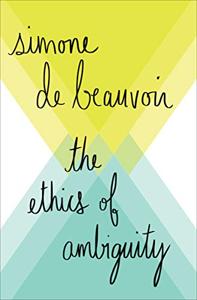
Want to learn the ideas in The Ethics of Ambiguity better than ever? Read the world’s #1 book summary of The Ethics of Ambiguity by Simone de Beauvoir here.
Read a brief 1-Page Summary or watch video summaries curated by our expert team. Note: this book guide is not affiliated with or endorsed by the publisher or author, and we always encourage you to purchase and read the full book.
Video Summaries of The Ethics of Ambiguity
We’ve scoured the Internet for the very best videos on The Ethics of Ambiguity, from high-quality videos summaries to interviews or commentary by Simone de Beauvoir.
1-Page Summary of The Ethics of Ambiguity
Overall Summary
Published in 1948 after World War II, The Ethics of Ambiguity outlines a practical system of ethics. Freedom is the most important thing to an existentialist and this freedom comes with ethical responsibilities. This essay builds upon Jean-Paul Sartre’s Of Being and Nothingness which ended by promising to develop an ethical system based on existentialism principles.
In The Ethics of Ambiguity, Sartre grapples with classic philosophical concepts: freedom, choice, human responsibility and the meaning of life. To understand this book’s significance in the larger conversation about existentialism (the idea that existence precedes essence), it is crucial to understand a key assumption of existentialist thought: that humans create their own meaning through choices and actions. In short, we make our own lives by making choices.
The Ethics of Ambiguity provides guidance on what choices to make and how to act. It takes into account things like freedom and responsibility as well as other important aspects of life such as love and death. Ultimately, it gives us a sense of purpose for living in an otherwise ambiguous world.”
The book The Ethics of Ambiguity is comprised of three parts. It starts with an epigraph from Michel de Montaigne, a philosopher who lived in the 16th century. He said that life itself isn’t inherently good or bad; it’s what you make of it. Religious people believe God gives them purpose and meaning for their lives, but existentialists believe humans are free to pursue whatever values they choose.
In Part I, de Beauvoir defines “ambiguous” and “freedom,” the two concepts essential to existentialism. If one believes man is totally free, as the existentialists do, then it follows that a person’s every move is weighted with ethical significance. Even if man tries to escape his freedom by doing nothing, that is still a choice. So, man’s relationship to freedom is of the utmost importance to de Beauvoir, and in Part II she outlines six different archetypal ways of being related to how one uses their freedom. In Part III she makes an explicit call for action against tyranny and fascism.
Part I
In Part I, Beauvoir establishes two main concepts that form the basis of existentialist ethics: ambiguity and freedom. These concepts are explored further in The Ethics of Ambiguity.
De Beauvoir begins by saying that paradoxes are embedded in the human condition because every person is both a main character and a minor character. A person must make decisions about their life, but they’re also just one of many people on Earth, so it’s hard to know what to do. If we embrace this messiness and ambiguity of our lives, then we can find meaning in them.
De Beauvoir and existentialists believe that the paradoxes of human existence are complex. They’re not easy to understand, but they can be resolved with a little effort. Many philosophers have tried to ignore or rectify these contradictions in their work, but most philosophers haven’t done this well enough. Existentialism is different because it has never shied away from ambiguity: “From the very beginning, existentialism has always defined itself as a philosophy of ambiguity.” Therefore, World War II made people more aware of how ambiguous life is; they felt like there was no way out.
De Beauvoir believes that freedom is essential to the human condition. It’s a core belief for existentialists, and they believe it wholeheartedly. De Beauvoir poses the question of whether this belief in freedom leads to despair because it puts so much responsibility on one person’s shoulders. She says that we can avoid despair by making sure our actions are based on reason rather than feelings.






